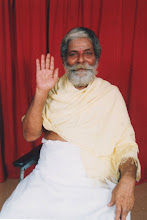I thought of posting only one Sutra at a time. The whole chapter contains all related Sutras of Samadhi only. But we will go one by one. But sometimes two or more sutras are inter-related.
Thats why I need to give whole idea by mentioning all related Sutras. So here I am giving the meaning of 2 Sutras.
Sutra 4: "Vritti sarupyamitartra"
At other times, when he is not in the state of Yoga, man remains identified with the thought-waves in the mind. He thinks that he is this body, mind, senses and thoughts. So he is ignorant and not in Yoga.
Sutra 5: "Vrittayah panchatayyah klishtaaklishtah"
There are five kinds of thought waves - some are painful, others are not painful.
When a person identify himself with his mind, it is painful. Here Pathanjali is saying that sorrowful thought waves are not necessarily "painful"; But the thought wave which brings with it an increased degree of ignorance, addiction and bondage. Similarly, a wave which seems painful at first may actually belong to the category of those which are "not painful", provided that it impels the mind towards greater freedom and knowledge. For example, Pathanjali would describe a lustful thought-wave as "painful", because lust, even after satisfied, causes addiction, bondage, jealousy to the person desired. A wave of pity, on the other hand, would be described as "not painful", because pity is an unselfish emotion which loosens the bonds of our own egotism. We may suffer deeply when we see others suffering, but out pity wil teach us understanding and hence, freedom.
This distinction between the thought waves is very important when we come to actual practice of yoga. The thought-waves are cannot all be controlled at once. We just need to observe and let go; but not to attach with it. First, we have to overcome the "painful" thought-waves by raising waves which are "not painful". To our thoughts of anger,desire, and delusion we must oppose thoughts of love, generosity and truth.
The idea that we should ultimately have to overcome even those thought-waves which are good, pure and truthful by observing in us. Because these thoughts still having ego-sense behind them. Thus the idea is to have the thought-less state. The mind of the truly illuminated man is calm- not because he is selfishly indiffrent to the needs of others, but because he knows the peace of the Atman within all things, even within the appearance of misery,disease.strife and want.
Now we need to go step by step as described in these Sutras.

No comments:
Post a Comment